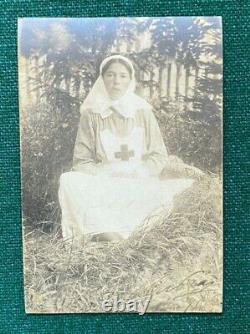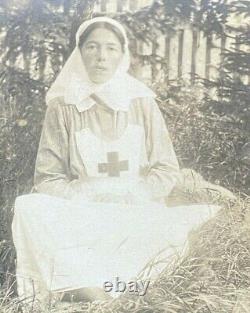Antique imperial Russian Photo Grand Duchess Olga Romanov 1915 Red Cross Nurse





Bibelotslondon Ltd is a UK registered company based in London Bridge dealing in ephemera and curiosities from Britain and around the world. Our diverse inventory is carefully chosen and constantly evolving. We work very hard to offer the highest quality works at competitive prices.
Our inventory is listed online, and we strive to keep our website completely up to date, so our customers can easily check availability. We believe in offering clients items that are unique and rare for aficionados of the antique and collector's world. Bibelot is a late nineteenth century word derived from the French word bel'beautiful', meaning a small item of beauty, curiosity or interest. The word ephemera is derived from the sixteenth century Greek word ephmera meaning a printed or hand written paper not meant to be retained for a long period of time. Grand Duchess Olga was the youngest child and younger daughter of Emperor Alexander III of Russia and younger sister of Emperor Nicholas II.
She was raised at the Gatchina Palace outside Saint Petersburg. Olga's relationship with her mother, Empress Marie, the daughter of King Christian IX of Denmark, was strained and distant from childhood. In contrast, she and her father were close. He died when she was 12, and her brother Nicholas became emperor. In 1901, at 19, she married Duke Peter Alexandrovich of Oldenburg, who was privately believed by family and friends to be homosexual.Their marriage of 15 years remained unconsummated, and Peter at first refused Olga's request for a divorce. The couple led separate lives and their marriage was eventually annulled by the Emperor in October 1916. The following month Olga married cavalry officer Nikolai Kulikovsky, with whom she had fallen in love several years before. During the First World War, the Grand Duchess served as an army nurse at the front and was awarded a medal for personal gallantry. At the downfall of the Romanovs in the Russian Revolution of 1917, she fled to the Crimea with her husband and children, where they lived under the threat of assassination.
Her brother and his family were shot by revolutionaries. Olga escaped revolutionary Russia with her second husband and their two sons in February 1920.
They joined her mother, the Dowager Empress, in Denmark. In exile, Olga acted as companion and secretary to her mother, and was often sought out by Romanov impostors who claimed to be her dead relatives. She met Anna Anderson, the best-known impostor, in Berlin in 1925. She led a simple life: raising her two sons, working on the farm and painting. During her lifetime, she painted over 2,000 works of art, which provided extra income for both her family and the charitable causes she supported.In 1948, feeling threatened by Joseph Stalin's regime, Olga emigrated with her immediate family to a farm in Ontario, Canada. With advancing age, Olga and her husband moved to a bungalow near Cooksville, Ontario. Colonel Kulikovsky died there in 1958. Two years later, as her health deteriorated, Olga moved with devoted friends to a small apartment in East Toronto.
She died aged 78, seven months after her older sister, Xenia. At the end of her life and afterwards, Olga was widely labeled the last Grand Duchess of Imperial Russia. Size: 9 x 6 cm approx. Photos form part of the description.
This item is in the category "Collectables\Autographs\Uncertified Originals\Historical". The seller is "bibelotslondon" and is located in this country: GB. This item can be shipped worldwide.- Country/Region of Manufacture: Russian Federation
- Type: Historical
- Sub-Type: Royalty
- Signed: Yes
- Object: Signed Photos

